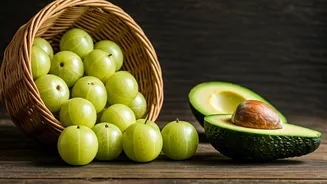Amla: Ancient Wisdom
Amla, the small, tart fruit, has a long and respected history within the realm of Ayurveda, the traditional Indian system of medicine. It's considered
a 'rasayana,' meaning it has rejuvenating properties, and is believed to promote longevity and overall well-being. For centuries, Ayurvedic practitioners have valued amla for its ability to balance the three doshas—Vata, Pitta, and Kapha—and to support various bodily functions. This ancient fruit is not just a source of nutrition; it's a key ingredient in numerous Ayurvedic formulations, used to address a wide range of health concerns. The enduring relevance of amla in Ayurveda is a testament to its effectiveness and its deep-rooted connection to Indian culture and healthcare practices, highlighting its importance in achieving holistic health.
Amla's Nutritional Power
Amla is a nutritional goldmine, packed with vitamins, minerals, and antioxidants that are vital for good health. One of its most notable attributes is its high vitamin C content, which surpasses that of many other fruits and vegetables. Vitamin C is a powerful antioxidant that helps protect the body from damage caused by free radicals, boosts the immune system, and aids in collagen production. Moreover, amla is a good source of fiber, which supports healthy digestion and promotes gut health. It also contains several other essential nutrients, like iron, which is necessary for the production of red blood cells, and calcium, critical for bone health. The combination of these vital nutrients renders amla as an important dietary choice for enhancing immunity, improving digestive functions, and supporting overall health.
Amla for Immunity
Amla is a natural immune booster, contributing significantly to the body's defenses. The high concentration of vitamin C in amla is key to its immune-enhancing properties. Vitamin C stimulates the production and function of white blood cells, which are crucial for fighting off infections. Regularly consuming amla can strengthen the immune system, reducing the frequency and severity of illnesses. The antioxidants in amla also play a role in protecting the body against damage from oxidative stress, thereby supporting the immune system's overall effectiveness. Including amla in your diet can be a proactive step towards building a robust immune system that is better equipped to handle seasonal ailments and other health challenges.
Digestive Health Benefits
Amla is an ally for digestive health, offering several benefits for those seeking to enhance their gut function. Its fiber content helps regulate bowel movements, preventing constipation and promoting regular elimination. The fruit also contains compounds that support the production of digestive enzymes, which are critical for breaking down food and absorbing nutrients effectively. Furthermore, amla can help soothe the digestive tract, potentially reducing inflammation and discomfort. Traditional Ayurvedic practices frequently employ amla to balance the digestive fire (Agni), which is crucial for optimal digestion. Regular consumption of amla can contribute to improved gut health and overall digestive well-being.
Amla for Heart Health
Beyond its immune and digestive benefits, amla offers valuable support for cardiovascular health. The antioxidants present in amla, particularly those that help neutralize free radicals, can protect the heart from damage. Amla helps in reducing LDL cholesterol levels, often referred to as 'bad' cholesterol, and may contribute to maintaining healthy blood vessels and reducing the risk of heart disease. Furthermore, amla’s properties might assist in managing blood pressure, contributing to its heart-healthy profile. Incorporating amla into your diet can be a proactive step toward supporting a healthy heart and overall cardiovascular function.
Easy Ways to Consume
There are numerous ways to incorporate amla into your diet, making it a versatile addition to your meals. Fresh amla can be eaten raw, although its tart flavor may require some getting used to. Many people prefer to consume it as juice, which can be mixed with water or other fruits to balance the taste. Amla powder can also be added to smoothies, juices, or even sprinkled on salads and other dishes. Another popular option is amla candy or preserves, providing a sweet and tangy way to consume the fruit. Home Chef Shruti's Grandma-Approved Amla Shot Recipe can also be followed which is a good way to begin incorporating it into your diet. This way, you can easily experience the health benefits of amla in a way that suits your preferences and lifestyle.












